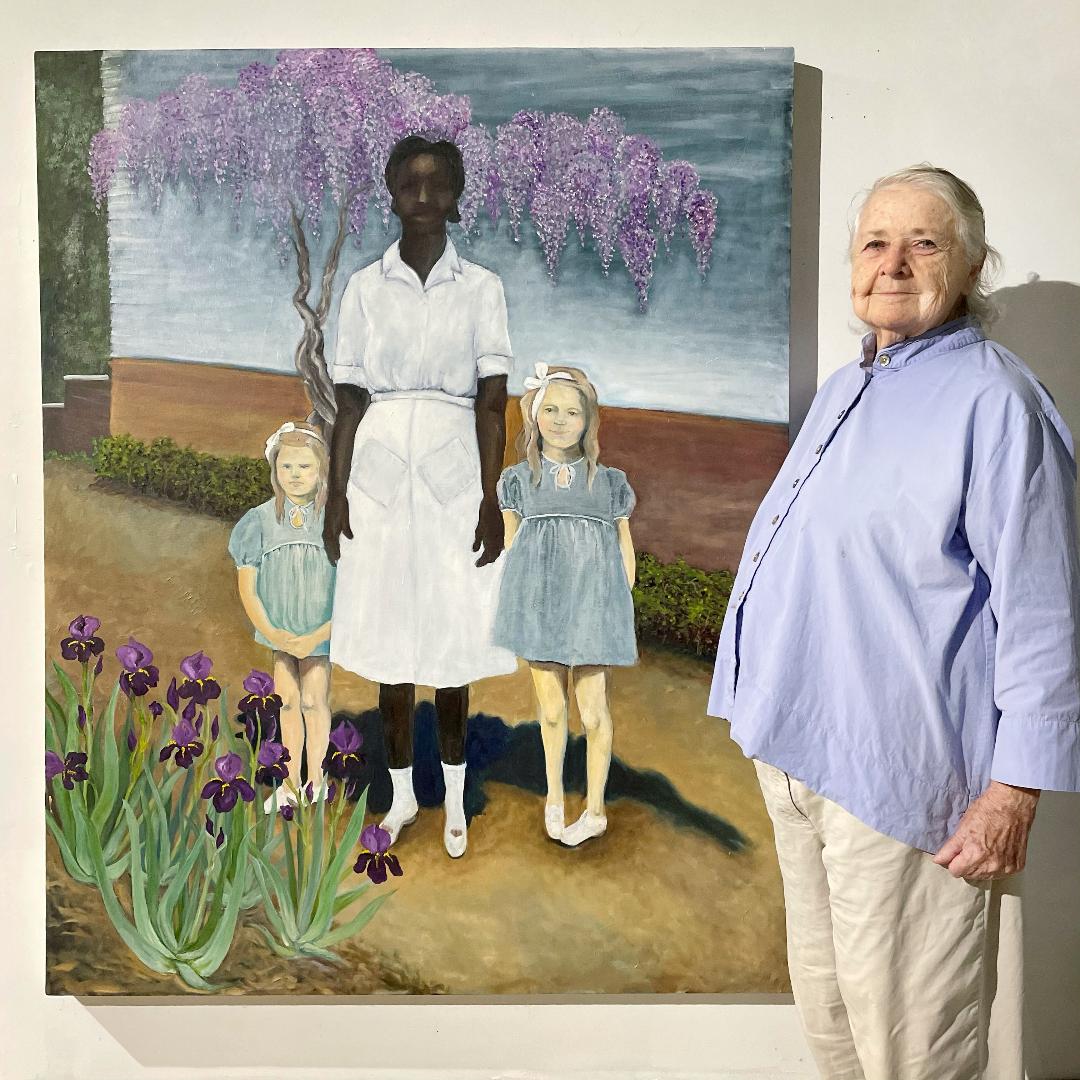
At 85, Asheville artist Connie Bostic maintains a creative pace that younger artists could envy. Almost every year since 1989, she has created major exhibitions of new work.
In each one, she finds fresh perspectives on two recurring and deeply personal concerns: what it means to grow up female in a small North Carolina town; and what it means to be a woman in a male-dominated society. Along with mining her own history, Bostic also often tackles larger social issues within her paintings, including gun violence, domestic abuse, racial injustice and poverty.
In her latest exhibition, Our Story, Bostic returns to her Spindale childhood. In 16 paintings, the artist pays tribute to the many local Black women who cared for white children in the first half of the 20th century.
Community input
The new series, says Bostic, “was sparked by a snapshot of my sister and me flanking an African American woman standing in front of my grandmother’s wisteria tree. I don’t remember the woman’s name, but I do remember being awestruck by the angle of the pockets on her dress.”
Bostic acknowledges that in the era of Black Lives Matter, a white artist exploring the role of African Americans in subservient roles might be courting controversy. The concern stayed with her throughout the early stages of the series, especially as white friends continued to share their own photos of these important caregivers.
“Did I have any right to depict these women?” she remembers asking herself. “Was this cultural appropriation?”
Seeking input from the African American community, Bostic invited four friends to individually visit her studio and react to the project: Annette Coleman, a retired banker and community leader; DeWayne Barton, founder of Hood Huggers International; storyteller Roy Harris; and photographer Andrea Clark.
“This was the real world, this is what happened,” Coleman says of Bostic’s paintings.
These Black women, Coleman continues, were often the first teachers these white children had. “They learned valuable lessons from them,” she notes.
Meanwhile, Harris recalls walking into the studio and spotting a familiar face — Tempie Avery, a beloved African American nurse, midwife and former slave of Asheville attorney and state Sen. Nicholas Woodfin. (To learn more, see “Tuesday History: The Half-Known Life of Tempie Avery,” Oct. 17, 2017, Xpress.)
“I’m a storyteller,” Harris says, “I got what [Bostic] was trying to do right away.”
Like Coleman, Harris considers the exhibit a part of the city’s collective history. And when it comes to a community’s past, Harris emphasizes, “My story is your story, your story is their story, and their story is our story.”
Untitled works
Unlike previous works, Bostic did not title any of her paintings in Our Story. Instead, each is identified with a number. The artist believes that works without titles require visitors “to think a little more deeply about what it’s about.”
Along with considering each work, Bostic hopes the public contemplates what the collection represents. The Black women featured in the exhibit, the artist notes, were an indelible part of the story of the children they helped raise.
At the same time, “it was our story too,” Bostic says, echoing Harris’ earlier point. “The fact that white people kept these photographs meant something. There is no doubt that these women played an important part in the social fabric of America. They deserve recognition.”
"artist" - Google News
September 16, 2021 at 10:00PM
https://ift.tt/3kmRw6J
Local artist honors Black female domestic workers - Mountain Xpress
"artist" - Google News
https://ift.tt/2FwLdIu
Bagikan Berita Ini














0 Response to "Local artist honors Black female domestic workers - Mountain Xpress"
Post a Comment